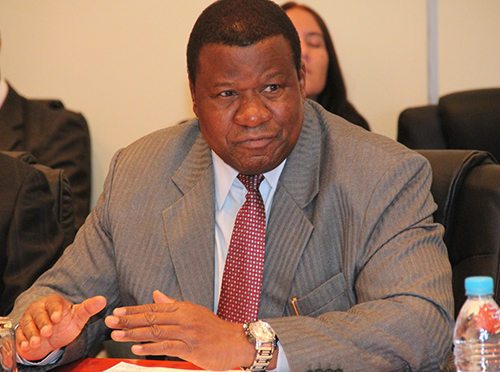4 June 2024
It is with great pleasure and anticipation that I welcome you in Windhoek to the International Civil Aviation Organisation (ICAO) Eastern and Southern Africa (ESAF) Aeronautical Meteorological Workshop.
This workshop brings together experts, regulators, meteorology service providers, regional partners and stakeholders in aviation meteorology to share knowledge, best practices, and the latest advancements in this ever-evolving field.
Through collaboration and the exchange of ideas, we aim to enhance our understanding of weather phenomena, improve the accuracy of weather forecasts, and ultimately strengthen the safety and efficiency of air travel.
As we gather here it is essential to acknowledge some recent developments, notably Amendment 81 to the ICAO Annex 3.
This amendment has brought about significant changes, shaping the future of meteorological services for international air navigation. Our discussions will explore the implications of this amendment, with a keen focus on operational meteorology (Opmet) unavailability, space weather requirements, and the integration of artificial intelligence in meteorology.
Amid our discussions on aviation meteorology, it would be remiss of me not to acknowledge the broader environmental challenges facing our SADC region and Africa, our continent. Namibia, like many countries in the region, is grappling with the harsh realities of drought and climate change.
he challenges posed by dynamic weather patterns and climate change underscore the importance of investing in cutting-edge technology, research, and training in aviation meteorology. By harnessing the power of data, technology, and collaboration, we can better equip ourselves to address these challenges and ensure the reliability of weather information crucial to aviation operations.
Namibia underwent a Universal Safety Oversight Audit Programme Continuous Monitoring Approach in March 2024 and achieved a remarkable 72,3% effective implementation. This performance exceeds the average Effective Implementation (El) of Eastern and Southern Africa, which stands at 60%, as well as the global average, which stands at 69,3%.
Furthermore, Namibia has achieved notable progress, including the successful certification of the Air Navigation Services service provider, implementation of Performance-Based Navigation (PBN) systems, development of Point in Space Navigation (PIN) technology, and infrastructure enhancements aligned to enhance safety measures. These efforts underscore Namibia’s commitment to enhancing aviation safety and efficiency.
Namibia has significantly advanced its meteorological capabilities in aviation, including the deployment of automatic weather stations, training programs for meteorological staff, and expansion of observation networks. Capacity building is crucial in any sector, and this is evident in the strides we have taken. These initiatives ensure the provision of accurate, quality-controlled weather information, crucial for safe aviation operations.
Aeronautical meteorology is critical to expanding the aviation sector with many more applications, such as offshore oil exploration and in hosting worldwide experts, as we embark on the journey to green hydrogen development within Namibia. The aviation industry thus leans on improved meteorological service, capacity, and technology.
As we convene on this auspicious occasion, I extend an invitation to each one of you to explore Windhoek, our beautiful capital city. Experience our local cuisine and immerse yourselves in the vibrant culture of Namibia.
I encourage you to venture out and explore the greater Namibia, with its rich biodiversity and stunning landscapes – from the majestic wildlife of Etosha National Park to the breathtaking scenery of the Namib Desert. There is much to discover and to appreciate in our country!
Allow me once again to express my sincere gratitude for your presence here today and for your unwavering support of initiatives that promote excellence and safety in aviation. Your expertise, insights, and contributions are invaluable as we navigate the complexities of aviation meteorology.
Together, let us embark on this journey of knowledge exchange and collaboration, with the shared goal of advancing the field of aviation meteorology for the benefit of shaping the future of aviation in Eastern and Southern Africa.
Stay informed with The Namibian – your source for credible journalism. Get in-depth reporting and opinions for
only N$85 a month. Invest in journalism, invest in democracy –
Subscribe Now!






